Are All Calories Created Equal?
Calories and weight loss. Do you really need to burn more calories than you take in? How many calories do you need to burn to lose weight? Are all calories the same?
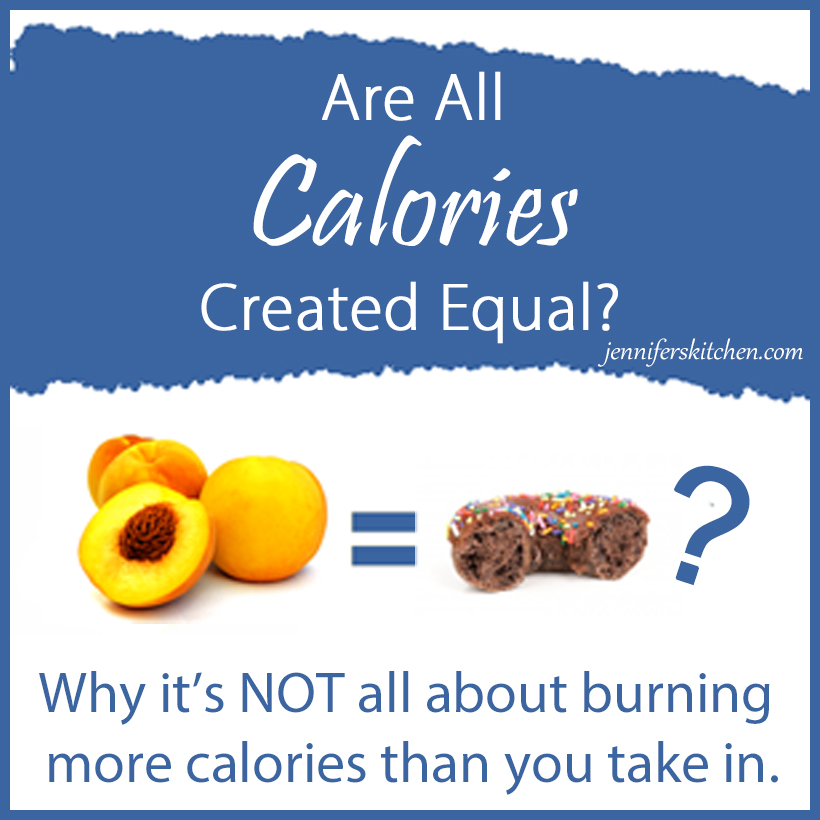
Typical Weight Loss Programs
Many diet programs teach that successful weight loss boils down to one thing: You have to burn more calories than you take in. Calories in versus calories out.
But is it really that simple?
Are All Calories the Same?
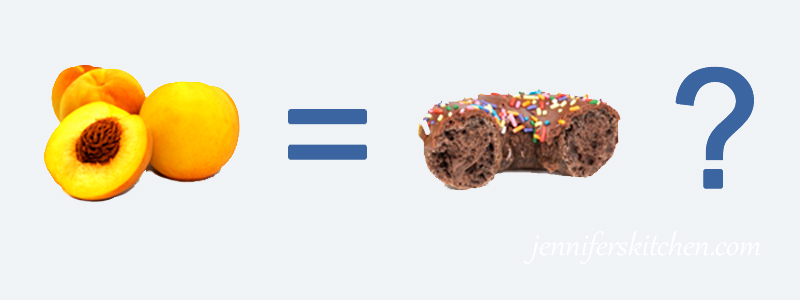
Are 400 calories of chocolate doughnut really equal to 400 calories of peaches or pears?
Do you think you would feel the same after consuming 400 calories of soft drinks as you would after eating 400 calories of baked potato and broccoli?
Doesn’t your body react differently to 400 calories of ice cream than it does to 400 calories of brown rice with steamed vegetables?
Same Number of Calories, Different Results
Researchers have found that, in many cases, overweight individuals actually consume approximately the same number of calories as their slim counterparts. But how can this be? If it’s a matter of calories in versus calories out, how can two individual consume the same number of calories and one be thin and one gain weight?
The answer lies in the fact that they are just not eating the same kinds of foods.
For example, a study done at the University of Southern California in Los Angeles of normal-weight adults and overweight adults, matched for height and age, revealed a marked difference in the normal dietary habits of the two groups. The overweight subjects consumed significantly more saturated fat and cholesterol and less fiber and complex carbohydrates than their normal-weight counterparts.
Two thousand calories of obesity-promoting foods are likely to add extra pounds. Two thousand calories of healthy foods – foods that help you lose weight – and weight loss becomes so much easier.
Calories and Weight Loss

While the number of calories you take in does play a small – very small – role in weight loss, there are other much more significant factors involved. The type of food you eat means so much more than how many calories are in the food.
Some foods increase your appetite, while other foods diminish your appetite. Some foods give you long-lasting energy. On the other hand, other foods drain you of energy. Some foods cause your body to store fat; other foods cause your body to shed the fat.
You can make your weight loss journey so much easier if you ditch counting calories and instead turn your attention to the kinds of foods you are eating.
What Foods Can Help You Lose Weight?
Individuals whose diets are based healthy, whole foods, like fruits, vegetables, whole grains, and legumes, on average, consume more food and yet weigh less than those whose diets are based on refined food, processed foods.
Want to Lose Weight and Keep it Off Forever?
Want to Do you want to learn how to eat more of these foods that help to lose weight? Join my Weight Loss Program and you’ll discover how you can eat delicious food, not count a single calorie, and watch the weight fall off.
You my also like:
Before you go . . .
Did you know that you can eat all this delicious food AND lose weight? You can!
No calorie counting. No portion sizes.
Join my online weight loss program today!

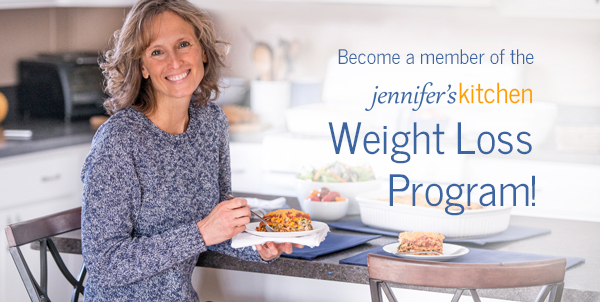
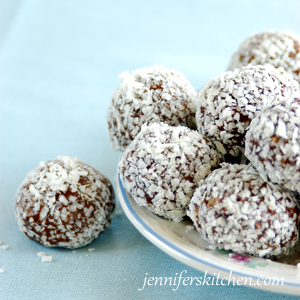
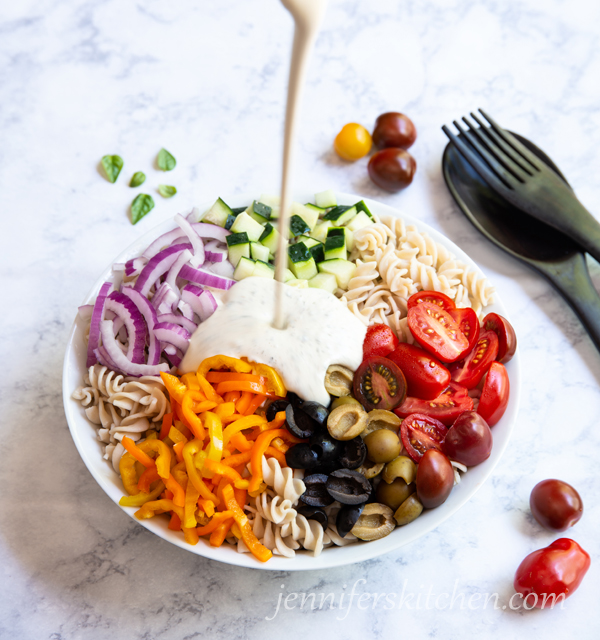
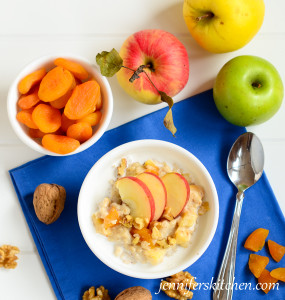
hi Jennifer, I would love to try some of your recipes but I notice that u alot of oil. Oil is very fattening and I can’t understand how one would be able to be healthy and lose weight with recipes that have olive oil coconut oil in them. Perhaps you could talk about why you do use oil in your recipes and are all your recipes plant based? Thanks. Diane
Hi Diane,
This is a very good question and you are absolutely correct. Even the “healthier” oils are still 100% refined fat and are indeed fattening.
Almost all of my recipes can be made with less oil than called for, and many readers do make this adjustment and still enjoy the dish because their tastes have already been adapted to a healthier diet.
So why do I use the amount of oil that I do in my recipes?
Well, one of my top goals is to help those who are accustomed to an unhealthy diet transition to a more healthy one. Adding a bit more oil to a recipe can help bring out flavors and provide more taste satisfaction for those whose diet normally consists of pizza, burgers, and ice cream. And yet – even with the oil – the dish is a far healthier choice than pizza, burgers, and ice cream. (What’s more, the new recipe can help expand their tastes and open their thinking to dishes that offer more in the way of whole foods.)
After time, once their tastes have adjusted to a healthier diet than they were previously consuming, individuals can continue to make improvements in their diet (such as cutting back on oil consumption). But that initial jump from pepperoni pizza to garbanzo salad is a pretty tough one for many, and I want to make it as easy as possible.
I’ve received countless emails from people who have incorporated my recipes into their diet and lost weight – probably because the recipes, being made from whole grains, fruits, vegetables, and nuts, were a much healthier option than what they were previously eating – even with the refined fat (oil). However, if you are already eating healthy, I would encourage you to cut back on the refined fats as much as you would like and you’re sure to see good results!
Thanks for the great question.
Jennifer
Thanks for the information! I agree, not all calories are created equal. Of course, exceeding eating a certain number of calories, and anything else will be stored by your body, but it’s most important to keep in mind the importance of maintaining balance when eating food. Like you’ve pointed out in this article, eating whole organic foods and avoiding any processed food leads to a healthy body by providing the body all of the nutrients that it needs so that it won’t feel like it has to store onto whatever has been consumed to stay alive.